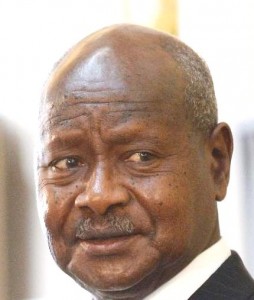Museveni debunks pessimism over Uganda’s growth
June 8, 2018—President Yoweri Museveni has hit back at those who say Uganda’s economy is doing badly, but he did ask Ugandans to cut down on importing goods like cosmetics and shoes which he considered trivial and instead concentrate on items that are manufactured locally to help support economic growth.
In the State of the Nation address, Museveni said Uganda’s economy was growing at the right pace and highlighted a recent prediction by the Harvard Center for International Development (CID), that suggested Uganda will be one of the fastest growing economies in the world by 2026.
“Many people do not know how the economy grows, although many pass themselves out as ‘experts’. These investments in the roads and electricity, along with the earlier decision ( in 2001) of strengthening the army, are beginning to result in the resumption of our usual high growth rates which had been interfered with by the shortage of electricity and, more recently, the drought.”
The 2017 CID report states in part the projections warn of a continued slowdown in global growth over the coming decade. India and Uganda top the list of the fastest growing economies to 2025, at 7.7 pc annually, but for different reasons. Uganda joins three other East African countries in the top 10 fastest growing countries, though a significant fraction of that growth is due to rapid population growth. On a per capita basis, Uganda is the only East African country that remains in the top 10 in the growth projections, though at 4.5 pc annually its prospects are more modest.
Currently, at less than 2 pc, Uganda’s inflation is at its lowest in over a decade and half, but private sector credit growth still lags far behind levels associated with a sustained business confidence despite significant drops in lending rates. Museveni, however in his characteristic style of delivery, reeling off figures at every opportunity, said the economy is recovery fast from the lows of 2016.
“This year, for instance, the economy will grow by 5.8% per annum. This will rise to over 7% per annum by the financial year 2019/2020,” the President said told his audience in Kampala. The speech comes a week before Uganda’s 2018/19 budget is read out.
Museveni said since 2006, when the government decided to start investing in development projects instead of leaving it sorely to Development Partners, there has been changes in increased electricity production, road construction and ICT infrastructure.
“Since 1986, only the British had helped us with the repair and upgrade of the Owen Falls dam from the miserable 60MW to 180MW. Since the economy had grown 6.6 times since the low level of 1986, those 180 MW were no longer enough. I proposed on the development budget of the country to start focusing on the roads and electricity. The budget for the roads was raised from UGX398 billion to UGX4.7 trillion ($1.2 billion) per annum. The budget for electricity was raised from UGX178 billion to UGX2,858 billion. It now stands at UGX2.77 trillion per annum,” Museveni said.
He said 58% of the roads in Uganda have been done or are being done using funds derived from domestic tax revenues. We are, of course, also grateful to the Development Partners for their contributions, although the dependence on Development Partners still remains significantly high.
“With electricity, all the district headquarters, except for Kaabong and Buvuma, have now been reached by the electricity wires. The generation capacity of Uganda will soon be 2,216 megawatts, once Isimba, Karuma and many of the mini-hydros are completed. Much of this work has been done by the Uganda Government money,” the President said.
He also asked them to reduce on the times they travel abroad for pleasure as this has become a major loss of income to most
Museveni said Uganda’s economic growth is unstoppable given what has been accomplished in ensurinig security through a strong army building, in education, health, the ICT backbone, roads, electricity, agricultural research for improved seeds, disease control and improved agro-practices.
He said, “What remains to be done is build the Standard Gauge Railway with the branches to Kasese, Kakitumba and South Sudan. I did not talk about the oil and gas because all the work is already done. It is just implementation that is remaining. The oil revenues will, obviously help us to fund our infrastructure and innovation programmes. The future is bright. Let us tighten discipline”


 African Heads of state head to South Korea next week for Summit talks
African Heads of state head to South Korea next week for Summit talks
 Trading leads as main source of income for Ugandans
Trading leads as main source of income for Ugandans
 New leadership for bankers’ umbrella as total assets top $12 billion
New leadership for bankers’ umbrella as total assets top $12 billion
 Brussels Airlines to announce Nairobi service
Brussels Airlines to announce Nairobi service
 SITA promises enhanced travel experience after Materna acquisition
SITA promises enhanced travel experience after Materna acquisition
 Saudia’s 105 aircraft order stretches A320neo lead over rival Max
Saudia’s 105 aircraft order stretches A320neo lead over rival Max
